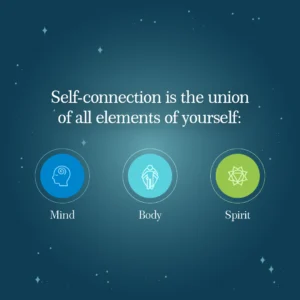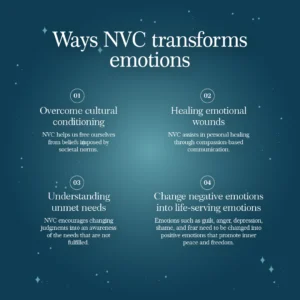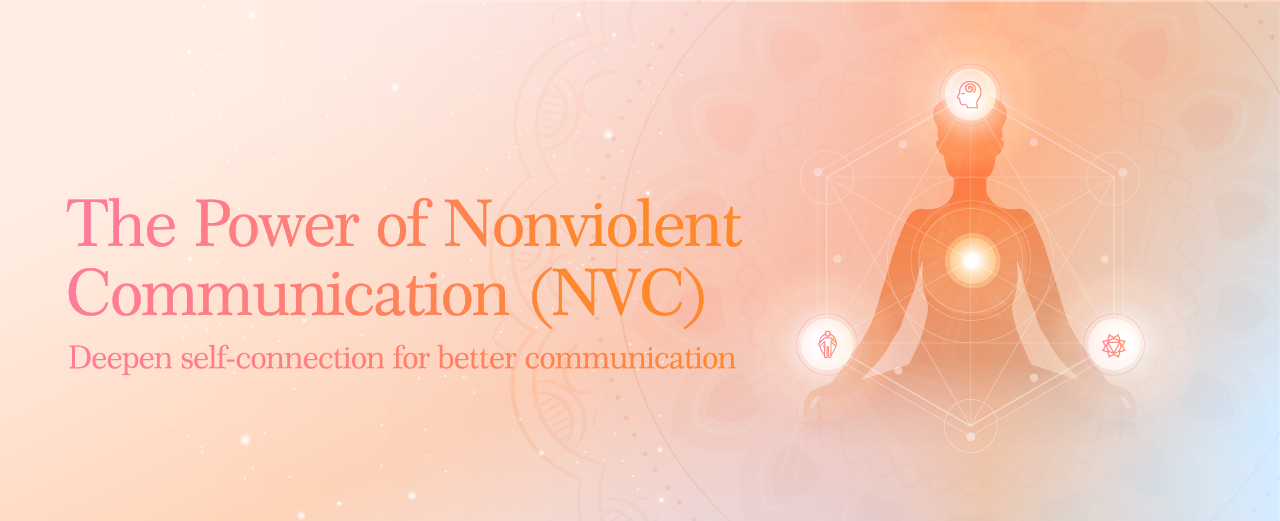Nonviolent Communication: Deepen Self-Connection for Better Dialogue
Ever found yourself reacting impulsively to a situation and later regretting it?
This is where self-connection through nonviolent communication (NVC) steps in – teaching us to pause, reflect, and respond thoughtfully. Nonviolent communication is an approach that supports the transformation of how we speak to ourselves and one another, one emphatic conversation at a time.
People often think of Nonviolent Communication (NVC) as a practice of communication with others. Yes, it is that. However, it is more of a practice of how we think and experience life and consciousness.
There are no positive or negative emotions; we feel emotions when our needs are met and emotions when our needs are not met.
As Marshall Rosenberg said: The first step is you have to say that you “can.”
When talking about the crucial first step before dialogue, I consider it an intentional form of conversation that we humans “can” have. Usually, people think it is necessary to rebuild connections, acknowledge differences, work towards healing, and create mutual understanding with others. But with NVC, we first learn to understand our needs and feelings, allowing positive conversation to emerge naturally from inner clarity.
When we first learn NVC, the procedure teaches us the steps along the path to reach our final destination – self-connection and connection with the other. In this blog, we will explore Non-violent communication, a procedure through which we can build self-connection and learn to express ourselves honestly while considering our needs.
What is Self-Connection?
Self-connection is the union of all elements of yourself: mind, body, and spirit.

Self-connection, for me, literally means what it says: I connect with myself. Connection with myself includes getting curious about what is going on inside me, analyzing my feelings and needs, paying attention to my inner voice, and deepening my capacity for finding inner peace.
A central aim of self-connection is to experience true inner choice and freedom about how I live and what I do.
Without self-connection, a person mostly acts from habits, and those habits do not significantly help them to fulfill their need. Self-connection is a key part of emotional intelligence skills because knowing yourself and how you impact others will help you maintain strong relationships, build trust, and improve communication. Self-connection can play a vital role in developing emotional intelligence skills because it helps you develop empathy, self-regulation, self-management, self-motivation, and communication.
Emotional intelligence skills are the ability to understand and manage our own emotions in a positive way to achieve our goals.
How Does NVC Build Self-Connection?
When conflict arises, we seek an empathic connection before finding solutions. Connecting with yourself helps you understand yourself and the world around you in a way that promotes self-acceptance and peace.
When NVC is used for self-connection, it offers a compassion-based framework for our inner journey, guiding us to listen to the whispers of our own heart before engaging with the world around us.
Self-connection is a place of compassion, truth, clarity and peace. Thus, to manage self-connection, NVC proposes a daily procedure known as “remembering” that includes prayer, meditation, inspirational reading, poetry, music, and quiet time in nature.
Ways NVC transforms emotions:
- Overcome cultural conditioning
NVC helps us free ourselves from beliefs imposed by societal norms.
- Healing emotional wounds
NVC assists in personal healing through compassion-based communication.
- Understanding unmet needs
NVC encourages changing judgments into an awareness of the needs that are not fulfilled. - Change negative emotions into life-serving emotions
Emotions such as guilt, anger, depression, shame, and fear need to be changed into positive emotions that promote inner peace and freedom.
There is a saying, “We are never angry because of what others say or do; it is a result of our own ‘should’ thinking.”
With NVC, we stay attuned to the beauty within, moment by moment. Thus, we can also call NVC “mindful communication” because this approach provides a conscious and helpful manner of relating to our thoughts, needs, and feelings to create metta-awareness. (Metta- as in loving-kindness for yourself and others)
How to Connect with Yourself Using NVC?
To be connected to yourself means getting in touch with who you are and what is important to you. To practice self-connection, one needs to listen to oneself. We can easily forge a deeper connection through journalizing, deep breathing, spending some alone time, validating ourselves, scheduling time for ourselves, and mindfulness and empathy.
You need to include NVC journaling prompts, like What am I feeling right now? or What needs are unmet?
To connect to yourself, you can also practice NVC by saying positive words such as “It is okay to feel emotions.”
Mindfulness can be practiced in any setting by bringing purposeful attention to emotions, needs, feelings, physical sensations, and surroundings. This allows for self-connection and regulation, leading to an increased capability to cope with stress. With NVC, we can unwind our self-judgment, speak to ourselves gently, reclaim our feelings, and develop our needs consciously.
Using the concept of nonviolent communication, many retreats are organized to build self-connection. People facing difficulty connecting with themselves can join retreats that help them explore their true selves through the lens of nonviolent communication.
Do you want to join retreats that can make your life more beautiful, but you have a question about “why attend?” let me help you with this.
As a Chopra-certified meditation Coach and Life Coach, I am hosting the “Speaking Peace: Deepening Connection” retreat along with certified experts in Nonviolent Communication (NVC) – Shantigarbha and Gesine Schrader, in Udaipur, to guide others on their inward journey.
In this retreat, you will learn and practice NVC to improve your self-connection and awareness.
Whether you are new to NVC or looking to improve your understanding, this retreat offers an opportunity to practice mindfulness-based stress reduction and transform your inner dialogue to help you enhance your ability to stay present and listen to the people around you, even when there’s conflict.
We would love to hear your thoughts on NVC and self-connection. What resonates with you the most from this post? Leave the comment below.
